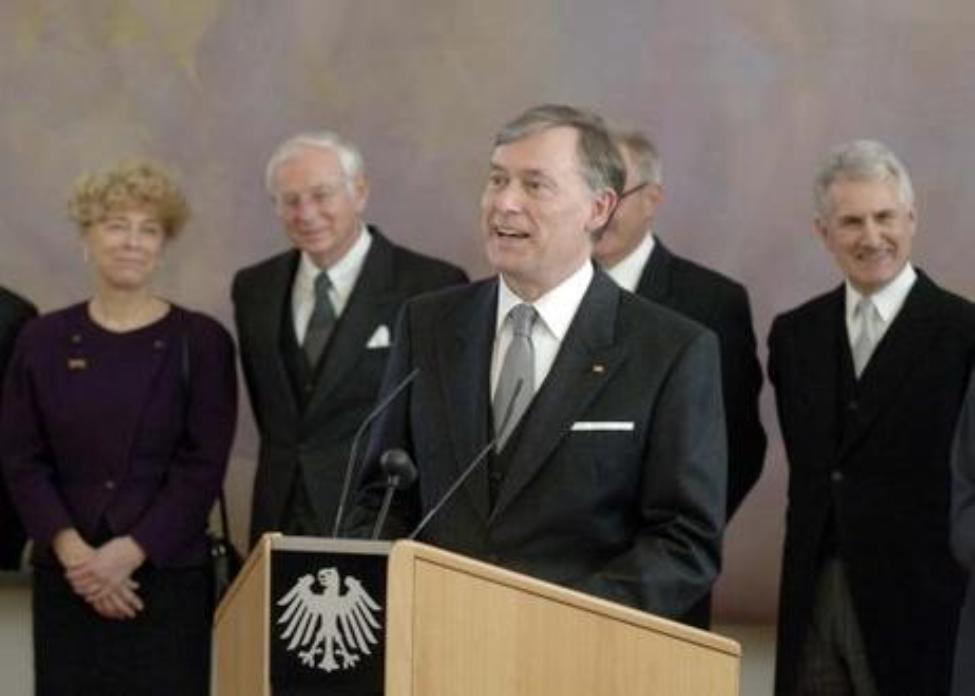I would like to extend a warm welcome to you in Schloss Bellevue. It has undergone 18 months of renovations. Now I can finally receive you at my official residence. I am delighted to be able to do so.
Nuncio, thank you for your kind words and your good wishes for the New Year. My fellow countrymen and I are looking forward to the Pope's visit to Germany in September.
The winds of change are blowing in Germany. Our country is rising to the challenges ahead of us. Chancellor Angela Merkel is building on the reform policy introduced by her predecessor, Chancellor Gerhard Schröder.
The grand coalition has the chance to tackle even difficult problems head on. It has a large majority in the Bundestag. The nation, too, has great confidence in the new government. This is a favourable climate for our country to make progress.
I am confident that Germany will come through this reform process with renewed vigour. And we will remain a reliable, strong and open partner for our friends in Europe and throughout the world.
We Germans care about Europe. For Germany, the European project will always be a key political concern, as was demonstrated again during the negotiations on the European Union's financial perspective in December.
Europedepends on cooperation between large and small member states, old and new members on a basis of equality and in a spirit of partnership. In Europe we have learned to treat one another with respect. We have realized that Europe's diversity is an asset. That is why we have been able to achieve many things over the past 50 years which had previously been considered impossible.
Today the European project is in trouble. Many people doubt whether Europe can really benefit them very much. Trust has been destroyed. Now a top priority of German and European policy is to rebuild that trust.
I am convinced that there are major tasks ahead which demand a united Europe, such as the fight against terrorism, cross-border crime, foreign and security policy, responses to global climate change and the eradication of poverty. Deepening the internal market also remains a common European task, of course.
Nevertheless, unity in these areas does not mean that everything in Europe has to be standardized. Our continent thrives on its diversity. We have to preserve and capitalize on this asset so that Europe can flourish without its citizens having to live under the threat of a European superstate. European cooperation should take more account of diversity. In this way we can dispel people's subliminal fears of losing their own identity.
The European model has so much potential! It is worth us putting our heart and soul into achieving it. This combination of market economy, social equality and cultural diversity embodies an inner strength which can offer Europeans continued peace, prosperity, jobs and political and social stability. Surely it is worthwhile to boldly embrace the necessary reforms now at both national and European level to preserve these assets!
We must not just pay lip service to partnership, within or outside Europe.
Partnership is possible whenever we find a balance between respect for others' differences and the awareness that we belong to the same family of man and have much in common. The adoption of the UNESCO Convention on the Protection and Promotion of the Diversity of Cultural Expressions last year was a valuable step in this direction.
In 2005 natural disasters inflicted suffering on large numbers of people and claimed many lives. Such disasters remind us of the fragility of life. They teach us to be humble. They warn us that we live in one world, and that we depend on one another. But they also demonstrate that human beings are capable of offering help and showing solidarity.
I was heartened to see the willingness of so many people, including in Germany, to do what they could to help last year following the disasters.
I was also encouraged by the fact that political leaders in Aceh and in Kashmir reached out to one another in the wake of the disasters and recognized that reconstruction requires peace.
And in those places which have not yet witnessed such positive developments, such as the provinces in Sri Lanka and the regions in Africa affected by civil war, we should redouble our efforts to make peace possible.
The UN World Summit in New York last September was intended to be a step towards improving international cooperation and establishing better global governance structures. But for many its outcome did not live up to expectations. The Summit's endorsement of the Millennium Development Goals was a positive aspect. But we are still dragging our feet on implementation. We cannot afford to delay for long. We need to give a new quality to development cooperation!
Neither can we abandon the goal of a pro-development trade regime. Developing countries must be given more chance to compete on the global market, not only in the area of raw materials, but also with processed products. We must be mindful of their desire for greater food sovereignty. And the poorest developing countries still need our assistance to be able to hold their own in global competition. It will not be enough to rely solely on a liberalization concept.
This year Germany is hosting friends from around the world. And the eyes of soccer fans from across the globe will be on our country this summer. I am really looking forward to it, and I, too, will be cheering from the stands. Please tell everyone in your home country that we in Germany will be doing everything we can to be good hosts to our visitors.
I would like to express my sincere thanks for our good cooperation over the past year. I hope that you feel at home in our country. I wish you, your families and your staff a peaceful, successful, happy and blessed New Year.


